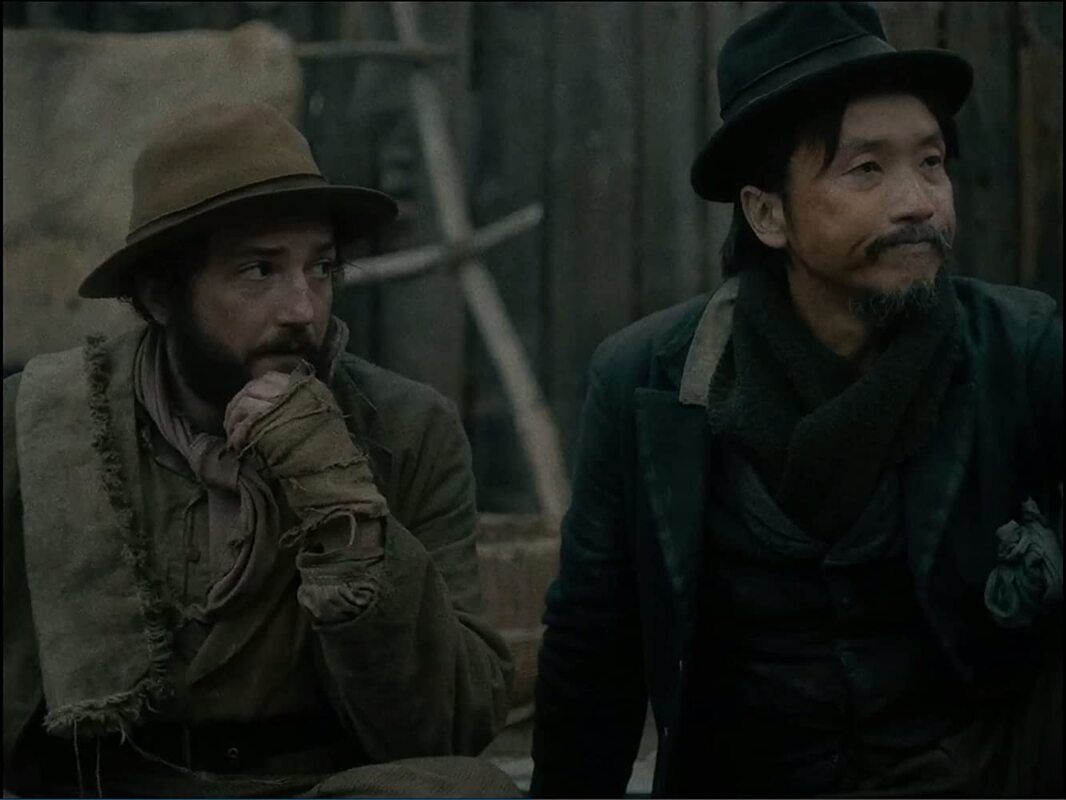Reichardt doesn’t really make cheery films. Her work is often about desperation, whether it’s the homeless human-animal duo in Wendy and Lucy or the lonely farmhand in Certain Women, and that’s not a state of being that lends itself to lightness. As it’s about a hopeful act, First Cow mirrors that hope in its warm and humorous tone that contrasts with the muddy aesthetic. Shot with natural light that makes the hardscrabble surroundings look more comfortable than they surely were, this is the first Reichardt film that doesn’t feel compressed and constrained despite Cookie and King-Lu being not much better off than her other protagonists. She makes the frontier look like a kind of entrepreneurial utopia, where money exists but after it’s been traded for raw materials, there’s little to spend it on. Cookie’s a migrant orphan and King-Lu is a non-white immigrant in a country whose citizens still own people, and will for several more decades, but Reichardt convinces the viewer that both are going to thrive based on ingenuity and skill and give rise to the fated meritocracy where the stolen cream rises to the top.
Of course, leave it to an Englishman to clot up that cream. Despite being the richest person in the camp, Jones’ Chief Factor provides a huge emotional punch to his first scenes, marveling over the oily cake as a little taste of the London that he’d much rather be in. The presumption that he’s going to be the equivalent of a heart-melted Anton Ego for the remainder of the film is upended immediately, as the viewer is treated to a conversation between Factor and his guard captain (Scott Shepherd) about whether it’s better to punish a man fairly or make an example of him to scare his coworkers. Factor’s on the ‘stick’ side, but by showing him first melting from Cookie’s oily cake, Reichardt reinforces that this is a man capable of feeling joy and gratitude. He just chooses not to in nearly all other facets of his life. Not only are Cookie and King-Lu too late for history, they’re reenacting a miniature American Revolution, where a smaller force tries to go its own way against its lord’s wishes, like they’re asking Chief Factor why, when he has so much already, he needs this, too.
It’s possible that Chief Factor wouldn’t care at all if his milk was being stolen from a subpar cow. This cow, however, I get what all the possessiveness was for. The cow here is stunningly beautiful, as is the way Cookie gently coaxes it towards calmness with small touches and whispered pleasantries. He’s got a Bob’s Burgers vibe as he chats/whispers with his source of food, a reminder that’s always welcome.
Whatever chemistry Cookie has with the cow is dwarfed by the relationship he has with King-Lu. This is a buddy-Western, a dedication to a male friendship that requires intimacy and honesty from its protagonists. Magaro’s sad eyes match the cow’s big wet ones, and the more jovial King-Lu, as played by Lee, works as someone who can pull information out of a person who would never volunteer it freely. Reichardt and her two lead actors know exactly who both of these guys are, and the viewer can recognize them as grounded types who might have equivalents in their real life. Surrounding our bonded pair are character actors like Ewen Bremner and Rene Auberjonois as town inhabitants who share in Reichardt’s humanist spotlight. She even shines it on wordless roles, like a young guard who waits in line unsuccessfully for his oily cake and slinks away like a sad Charlie Brown. His commitment to his dejection sells how good the oily cakes are and how much work Cookie could conceivably find if things go well.
The Reichardt I know eventually shows up, as there are only a few places First Cow can go. First Cow flirts with repudiating the director’s penchant for Murphy’s Law in action, but eventually, the real business must begin. Cookie and King-Lu make the mistake of not knowing when to quit, turning their need for one more day, one more sale, one more oily cake, into a kind of addict language that’s perfectly suited for the story of America itself. This time’ll be different in this place. We’ll escape the old ways and do it better than they could ever have dreamed. Instead, the second hit is never as good as the first, nor the third as good as the second, but there can only be the chasing of it. First Cow beautifully sees the chasers and shows them what the finish line might look like, but she showed the viewer first. It’s definitively American to know what happens and just hope that it doesn’t. A-

 RSS Feed
RSS Feed